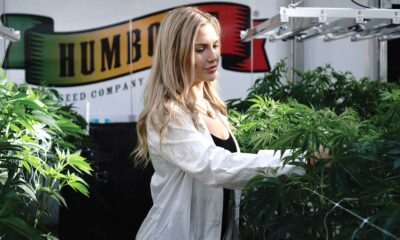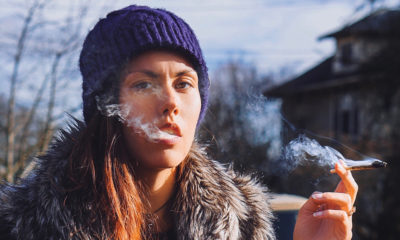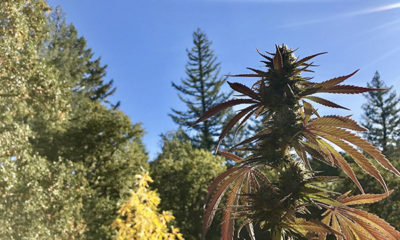
Joint Opinions
The 420 Holiday: Who’s It Actually For?
We’ve gone directly from the War on Drugs to drug subsidized civic party: Something’s lost along the way.
Cannabis’ journey toward legalization in the US is helpful in understanding the shift taking place around the 420 holiday. Although legal marijuana in the US owes an unpayable debt to San Francisco—to the struggles and the activists living in the city, those affected by AIDS and the counterculture warriors who laid the groundwork for the first legal cannabis in the nation—the historic relationship between cannabis and the “official” San Francisco, the civic leaders and the electeds, is at best uneasy and erratic.
Here’s a data point. Back in 2010, when California had the chance to be the first state in the country to legalize adult-use cannabis, it was San Francisco elected officials—then-Mayor Gavin Newsom, then-District Attorney Kamala Harris and Senator Dianne Feinstein—who led the charge against legalization. Voters listened, and Prop. 19 lost that fall by seven percentage points.
Here’s another: Now, in 2022, in California’s fifth year of adult-use legalization, with the local tourism economy in the toilet post-COVID-19 pandemic and civic leaders desperate for a boost, San Francisco City Hall and local business boosters have launched a 420-themed “cannabis festival.” Official weed-themed scavenger hunts, historic walking tours and dispensary visits, all predicated on the hope that cannabis can help bail the ailing city out.
When the city is in need, weed is there, a handier ATM than casinos or parking tickets, and 420 is the shill. But how about the flip side? Every legal cannabis business says they desperately need tax relief to stay alive, to ensure legalization doesn’t fail and box out the much more affordable illicit market. All that’s up to someone else, say Newsom, Harris or Feinstein. So far, nobody’s pledged to reciprocate.
This history is relevant because it illuminates something, about cannabis broadly, and 420 in particular.
The Slow Capture of 420
After decades of shunning and scorn, weed’s sudden embrace as a point of civic pride is part of the slow but unmistakable tectonic shift we’ve witnessed in our lifetimes—from when a nub of a burnt-out joint, a scale or more than two baggies was casus belli for millions of people to become victims of the War on Drugs. Fast forward to present day, and there are almost enough billion-dollar cannabis companies to field a baseball team.
There’s progress and that’s good. But something else is happening. 420 itself, instead of a renegade act of mass defiance—shamed in the media for being too messy—is now an official permitted event, complete with vendors, on-site sales…and rules. Officially at least, you can’t bring your own stash into Golden Gate Park this year. You can smoke all you want, provided you buy from the right people who paid for the privilege.
The slow capture of the 420 holiday begs a question: Just who’s all of this for?
Caryn York smokes weed. She smokes even after she was arrested for petty possession in 2003, the summer after her freshman year in college, and spent the night in jail for three grams of cannabis. She got probation but, as the judge warned her, her life was very nearly derailed—for three grams of weed
Today, a professional and the executive director of the Women’s Prison Association, which advocates for women formerly and currently incarcerated, she still smokes. But for York, a Black woman from Baltimore, 420 hits different than it does for some of the rest of us.
“420 was never really a holiday in the Black community,” she said in an April 15 interview. With the episodes like the night when a city police officer swooped on York and her friends smoking in a park, bringing them to jail, “We’d celebrate 420 in secret,” she said. “I didn’t really learn about 420 until I was in college.”
While at university, she discovered her white friends engaging in what looked a little like a goofy sorority ritual: speaking in code words, arranging a rendezvous on a special day, at a specific time. And for what, exactly? They weren’t at the same risk. This was just a game. And what if you smoked every day—for pain or for pleasure, physical or mental?
York lives in New York City now, as I do. In NYC, where Rudy Giuliani’s lasting legacy is ramping up marijuana arrests from a few thousand a year in the early 1990s, to more than 50,000 by the year 2000, legalization is still fresh and new. It doesn’t hurt you can smoke cannabis wherever you can smoke tobacco without the risk of copping a ticket, a right still denied to cannabis users in California, Colorado, Oregon and every other state that legalized cannabis a decade ago.
In New York, in only the second 420 of the state’s adult-use legalization, it’s a massive party, a free-for-all. Rooftop parties, VIP smoke-outs, an enormous crowd in Washington Square Park, where plugs set up card tables and trap all day without fear of police who can only write a $250 violation for petty sales.
This is all great. In New York, the 420 holiday is not corporatized, monetized or captured yet by the same establishment that spent decades trying to quash, discourage or shame it. But something’s still missing.
“When I think of 420 today, I actually don’t connect it to any of the current efforts to legalize marijuana,” York told me. “We have to go deeper.”
For example: New legalization laws automatically expunge old criminal records of marijuana offenses that are now legal. That’s nice—but marijuana arrests weren’t designed to simply snare someone for smoking weed. The smell of marijuana was probable cause to search your pockets or your car, to check your probation status. Legalization doesn’t clear other charges racked up after the smell of pot drew in police like moths to a lightbulb.
“It’s personal for me,” York said. “It’s triggering a bit, where it’s like, I went to jail for this shit. I had a criminal record that I had to actively have expunged.”
One may say 420 is a holiday and not the time to think about the work. That might land if it weren’t for the fact that most of us don’t think about it much on the other 364 days, either.
Is 420 The Next Hallmark Holiday?
It was somewhere between the billboards making dusty stoner puns in order to pimp pizza rolls; the ads featuring red-eyed, droopy-lidded anthropomorphic food containers—whether it was Buffalo Wild Wings or someone else, I can’t remember and I don’t care. It was somewhere between the smarmy best junk-food to eat on 420 listicles and Carl’s Jr stuffing CBD in its hamburgers for whatever reason, when the 20th day of April started to feel a little old, a little played-out.
All this was inevitable. Complaining about America doing an America is 21st-century tilting at windmills. In the same way the cannabis legalization movement gave way to a capitalized industry, “tax and regulate” means 420 completes its long and predictable journey from teen-aged inside joke, to counterculture milestone, to crass marketing opportunity. A Hallmark card can’t be far behind, when what we really could use is a federal holiday for the millions and millions of drug-war victims.
Because that’s the thing. The War on Drugs isn’t over. Weed was the easiest catch—everyone uses it, it stinks up the room—but cannabis prohibition was just the most obvious symptom of an overall malady that’s still plaguing us. We’re still sick, but here we are, releasing ourselves from the hospital, shaking society’s hand—a hand that, until just a little while ago, held a knife stuck into our backs. Let’s wipe the blood off before we have a party.
It’s nice that the 420 holiday is bigger than ever and people are having fun. I genuinely hope more people smoke weed. But 420 should also have at least some acknowledgment of the unfinished business at hand. Instead, it’s business as usual.
























